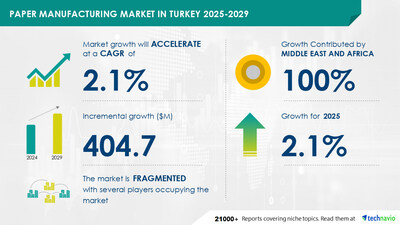Paper Packaging Revolution: Turkey's Market Set to Surge by $404.7M, AI and Food Trends Fuel Explosive Growth

AI Reshaping Turkey's Paper Manufacturing Market: A Growth Trajectory Emerges
The paper manufacturing landscape in Turkey is undergoing a transformative phase, with market projections indicating substantial growth potential. According to recent research by Technavio, the sector is poised to expand by an impressive USD 404.7 million between 2025 and 2029, advancing at a steady compound annual growth rate (CAGR) of over 2.1%.
As the market becomes increasingly fragmented, key players are strategically positioning themselves by forging robust partnerships across diverse sectors. Leading manufacturers are actively seeking collaborative opportunities with automotive, industrial, and commercial enterprises to enhance their competitive edge.
Prominent companies like Alkim Alkali Kimya AS and Eczacibasi Holding are at the forefront of this strategic repositioning, leveraging innovative approaches to navigate the evolving market dynamics. Their proactive stance reflects the industry's commitment to adaptation and growth in an increasingly complex business environment.
The ongoing market transformation suggests a promising future for Turkey's paper manufacturing sector, driven by strategic partnerships, technological advancements, and a keen understanding of emerging market trends.

